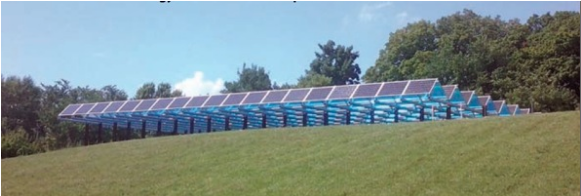Laura Burrington February 5, 2015

The Wright-Hennepin Cooperative electric association’s community solar garden was installed by the rural renewable energy alliance, a local nonprofit. Photo credit: Rural Renewable Energy Alliance
The Minnesota Renewable Energy Society (MRES) launched a $4 million 1-megawatt community solar garden (CSG) project this fall, with the assistance of a $2.6 million grant from the Xcel Energy Renewable Development Fund. The grant is funded under a state-mandated program initiated 20 years ago to promote new renewable energy technologies, programs, and research. Utility company Xcel Energy contributes money annually to the fund based on the number of dry used fuel storage containers at its two Minnesota nuclear plants. In 2014 more than 20 renewable energy projects were funded with $42 million.
MRES’ community solar project is the only project funded that will be putting the new community-shared solar legislation, passed in 2013 in Minnesota, into practice. The project will comprise two 500-kilowatt solar-electricity facilities—one in an urban area and one in a rural area—which MRES expects to be installed in 2015.
The purpose of the project is threefold—to pilot CSG installation practices by nonprofit community entities, to evaluate the market value of local versus remote CSG participation, and to publicly document the critical path decision-making that public or nonprofit entities must attend to in order to realize a successful installation and attract subscribers. MRES also hopes to create a space for a discounted purchase price for low-income people and nonprofit entities.
Nonprofit entities often have difficulty making a solar installation pencil out because they cannot take advantage of the federal tax credit. The community solar model allows investors to take the tax credit and pass these savings on to the subscriber.
Community solar is a new model for solar energy ownership. The community solar model allows renters, condo association homeowners, homeowners without suitable space for solar, and other community members who have no solar resource or limited financial means to install a full-sized solar energy system to buy into a jointly owned system. Electricity customers will be able to purchase a subscription from a solar garden that is in the same county or contiguous county to their residence, and have the energy produced by the solar garden credited to their utility bill. Currently, at least four cooperative utilities have launched community solar gardens in Minnesota, but none have been built yet in Xcel Energy territory.
MRES expects that this CSG project will be able to fully power more than 150 homes, or allow for 5,000 subscribers each at the lowest subscription level (200 watts, or about 240 kilowatt-hours per year). Learn more about the project at mnrenewables.org/community-solar.
Laura Burrington (laurab@mnrenewables.org) is the managing director of MRES. Find an ASES chapter near you go to ases.org/chapters.